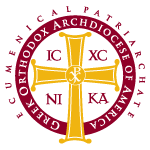FAQs
Will the service be all in Greek, or will I be able to follow?
The majority of the service will be in English, but with a mix of liturgical (koine) Greek as well. Many hymns, prayers, or readings will be sung or read once in Greek and then once in English, and a hymn that is sung in Greek one week might be sung in English the next week. The hymns and the teachings they contain are thus accessible even for those of us who don't understand a word of Greek. Bilingual liturgical texts for every service are available online, making it fairly easy to follow along with the service—you'll see several people following along with the text of the service pulled up on their phones. With time, even non-native speakers of Greek learn to pray in Greek in their hearts.
The koine Greek that is used in our services is the same dialect of Greek that the New Testament was written in. So when we read the Gospel or say the Lord's Prayer in Greek, we are saying and hearing the same words in the same language as the apostles and the first generations of Christians. This direct and living connection through history to the earliest Christians is one of the beauties of the Greek Orthodox faith.
Is there some sort of nursery or child care during the service?
No. Children are full members of the Greek Orthodox Church from the moment they are baptized, and we do not exclude them from participating in our liturgical life just because they are young. For small children, some amount of crying or talking perfectly normal and will not be a disruption to the service. If you have a child who who starts to have a difficult time, you are welcome to step outside for a moment. You can find bathrooms with a changing table in the basement level of the Cathedral near the entrance on the left side of the church building, and there is a nursery area available in the lower level of the Cultural Center.
Can I receive Communion?
Holy Communion is offered only to Orthodox Christians who are in good order with the faith, life, and canonical discipline of the Greek Orthodox Church. Non-orthodox worshipers may receive a blessing from the priest or deacon during Communion, but most worshipers who do not intend to receive Communion will simply stay in their pews when communicants go forward to partake.
After receiving Communion, people will take a piece of blessed bread known as antidoron (meaning, “instead of [the Eucharistic] gifts”) from an altar server. The priest will also distribute this bread at the end of the service. This is not part of Communion, so if someone offers you a piece of antidoron when Communion is being offered, you are welcome to accept it as a sign of fellowship.
Don't you celebrate Christmas on a different day?
All Orthodox Christians celebrate Christmas on December 25th. The problem is, we don't all agree on when exactly December 25th occurs. Some Orthodox traditions use the Julian calendar (the “old calendar”) for determining feast days. The Julian calendar is currently 13 days behind the standard Gregorian calendar (the “new calendar”), so when December 25th arrives according to the Julian calendar, the date on the Gregorian calendar is already showing January 7th.
The Greek Orthodox Archdiocese of America uses the new calendar for our liturgical life, so we celebrate Christmas on the same December 25th as the calendar on your phone expects.
But Easter is later, right?
Usually, yes. Easter, typically called Pascha in Orthodox communities, is celebrated on the first Sunday following the first full moon after the spring equinox, which is the same formula used by the Roman Catholic Church and Protestants. However, (most) all Orthodox Churches, even those that use the “new calendar” for the dates of fixed feasts, use the older Julian calendar to determine the date of the equinox, and by extension, the date of Pascha. As a result, Pascha (Orthodox Easter) is usually observed a week or two after Easter is observed by the Roman Catholic Church and other western Christian communities, although depending on how calendars and the lunar cycles align in a given year, Easter could be the same Sunday for both calendars, or they could be as much as a month apart. While we pray for the day when all Christians are again unified in when we celebrate our Lord's Resurrection and his victory over the power of death, in the meantime, we typically get excellent deals on our Easter candy.
I am not Greek (or Russian, or Lebanese, or Serbian…). Is there a place for me here?
Yes! The Orthodox Church is for all peoples, not just for those with ethnic backgrounds that happen to be traditionally Orthodox. In our parish of St. George Greek Orthodox Cathedral, a majority of our parishioners do have Greek ancestry to some degree or another, and we take pride in our Greek heritage (the language, food, history, and culture). But we also have plenty of members from Lebanese, Romanian, and Slavic Orthodox backgrounds as well Italian, Polish, English, African-American, and other plenty of other backgrounds that aren't traditionally Orthodox. You'll find converts from a wide variety of religious backgrounds: Roman Catholic, evangelical and mainline Protestant, atheist, and nothing in particular. Our parish was established by Greek-American immigrants a hundred years ago, but it is defined by Christ, not by being Greek. Whatever your background, wherever you're coming from, you can find a home in the Greek Orthodox Church. Ours is a welcoming community, and we warmly invite you to join us!

